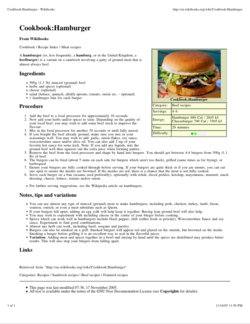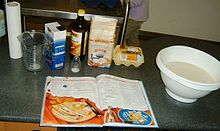- Recipe
-
This article is about culinary recipes. For a discussion of semiconductor IC recipes, see Semiconductor fabrication.
 An example recipe, printed from the Wikibooks Cookbook.
An example recipe, printed from the Wikibooks Cookbook.
A recipe is a set of instructions that describe how to prepare or make something, especially a culinary dish.
Contents
Components
Modern culinary recipes normally consist of several components
- The name (and often the locale or provenance) of the dish
- How much time it will take to prepare the dish
- The required ingredients along with their quantities or proportions
- Equipment and environment needed to prepare the dish
- An ordered list of preparation steps
- The number of servings that the recipe will provide (the "yield")
- The texture and flavour
Some recipes will note how long the dish will keep and its suitability for freezing. Nutritional information, such as calories per serving and grams of protein, fat, and carbohydrates per serving, may also be given.
Earlier recipes often included much less information, serving more as a reminder of ingredients and proportions for someone who already knew how to prepare the dish.
Recipe writers sometimes also list variations of a traditional dish, to give different tastes of the same recipes.
History
The earliest known recipes date from approximately 1600 BC and come from an Akkadian tablet from southern Babylonia.[1]
There are ancient Egyptian hieroglyphics depicting the preparation of food.[citation needed]
Many ancient Greek recipes are known. Mithaecus's cookbook was an early one, but most of it has been lost; Athenaeus quotes one short recipe in his Deipnosophistae. Athenaeus mentions many other cookbooks, all of them lost.[2]
Roman recipes are known starting in the 2nd century BCE with Cato the Elder's De Agri Cultura. Many other authors of this period described eastern Mediterranean cooking in Greek and in Latin.[2]
Some Punic recipes are known in Greek and Latin translation.[2]
Much later, in the 4th or 5th century, appears the large collection of recipes conventionally entitled 'Apicius', the only more or less complete surviving cookbook from the classical world.[2] It chronicles the courses served which are usually referred to as Gustatio (appetizer), Primae Mensae (main course) and Secundae Mensae (dessert).[3] The Romans introduced many herbs and spices into western cuisine, Renfrew[4] states that basil, bay, dill, fennel, mint, parsley, rue and thyme were all common in Roman cooking.
Arabic recipes are documented starting in the 10th century; see al-Warraq and al-Baghdadi.
King Richard II of England commissioned a recipe book called Forme of Cury in 1390,[5] around the same time another book was published entitled Curye on Inglish.[6] Both books give an impression of how food was prepared and served in the noble classes of England at that time. The revival of the European class system at this time brought entertainment back to the palaces and homes of the nobility and along with it the start of what can be called the modern recipe book. By the 15th century, numerous manuscripts were appearing, detailing the recipes of the day. Many of these, such as the Harleian MS[clarification needed] 279, Harleian MS 4016, Ashmole MS 1429, Laud MS 553 and Dure MS 55,[7] give very good information and record the re-discovery of many herbs and spices including coriander, parsley, basil and rosemary, many of which had been brought back from the Crusades.
During the 16th and 17th centuries, competition between the large houses became commonplace and numerous books were written on how to manage households and prepare food. In Holland[8] and England[9] competition grew between the noble families as to who could prepare the most lavish banquet. By the 1660s, cookery had progressed to an art form and good cooks were in demand. Many of them published their own books detailing their recipes in competition with their rivals.[10] Many of these books have now been translated and are available online.[11]
By the 19th century, cooking had become a passion throughout the world. Using the latest technology and a new concept in publishing, Mrs Beeton (1836–1865) published her famous Book of Household Management in 24 monthly parts between 1857 and 1861. The American cook Fannie Farmer (1857–1915) published in 1896 her famous work The Boston Cooking School Cookbook which contained some 1,849 recipes.[12]
Recipes on TV and the Internet
By the mid 20th century, there were thousands of cookery and recipe books available. The next revolution came with the introduction of the TV cooks. The first TV cook in England was Fanny Craddock who had her show on the BBC, later followed by chefs such as Graham Kerr (known as the Galloping Gourmet). These TV cookery programs brought the recipes of these cooks to a new audience who were keen to try out new ways of cooking. In the early days, the recipes were available by post from the BBC and later with the introduction of the CEEFAX text on screen system, they became available on the television. The new companies of Channel 4 and S4C also brought recipes to the television with their own text system called ORACLE.
In the early 21st century, there has been a renewed focus on cooking at home due to the late-2000s recession.[13] Television networks such as the Food Network and magazines are still a major source of recipe information, with international cooks and chefs such as Jamie Oliver, Gordon Ramsay, Nigella Lawson and Rachael Ray having prime-time shows and backing them up with Internet websites giving the details of all their recipes. Internet sites such as AllRecipes, Epicurious and Food Network have become extremely popular destinations to find recipe information, as well as mobile applications. Even reality TV shows such as Top Chef or Iron Chef challenged the idea of culinary arts by having chefs compete against each other in culinary challenges. Internet sites are a free source of many recipes.
Recipes - for the most part - missed the Web 2.0 innovation spurt, possibly a lingering effect from early food web failures such as Webvan. By 2010, with a renewed sense of innovation and optimism in the technology world, there were a new crop of recipe sites that were using semantic, social, and communal principles to advance the category online.
Today, despite the Internet, cookery books are as popular as they have ever been (if not more so).
Recipe design tools
While traditionally one needs to buy ingredients listed in recipes, modern technology brought tools that enable reverse recipe lookup - users list ingredients they have, and the tool retrieves recipes they can make.[14]
Molecular gastronomy provides chefs with cooking techniques and ingredients. But this discipline also provides new theories and methods which aid recipe design. These methods are used by chefs, foodies, home cooks and even mixologists worldwide to improve or design recipes. Foodpairing identifies which foods go well with one another. The method provides food and/or beverage combinations that are solely based on the flavor profile of the food and beverage products.
See also
- Culinary
- Culinary art
- Cookbook
- Rhyming recipe
- hRecipe - a microformat for marking-up recipes in web pages
References
- ^ Jean Bottéro, Textes culinaires Mésopotamiens, 1995. ISBN 0931464927; commentary at Society of Biblical Literature
- ^ a b c d Andrew Dalby, Food in the Ancient World from A to Z, 2003. ISBN 0415232597 p. 97-98.
- ^ "Roman food in Britain". http://romans-in-britain.org.uk. Retrieved 2007-05-10.
- ^ Renfrew, Jan (1996). Food and Cooking in Roman Britain. English Heritage. ISBN 1850740801.
- ^ COMDA Calendar Co.. 2007 Recipe Calendar. COMDA, Canada.
- ^ Hicatt, Constance B; Sharon Butler (1985). English Culinary Manuscripts of the 14C.
- ^ Austin, Thomas (1888). Ashmole and other Manuscripts.
- ^ Sieben, Ria Jansen (1588). Een notable boecxtken van cokeryen.
- ^ anon (1588). The good Huswifes handmaid for Cookerie.
- ^ May, Robert (1685). The accomplifht Cook.
- ^ Judy Gerjuoy. "Medieval Cookbooks". http://www.pbm.com/~lindahl/articles/food_bibliography.html. Retrieved 2007-06-15.
- ^ Cunningham, Marion (1979). The Fannie Farmer Cookbook (revised). Bantam Books, New York. ISBN 0553568817.
- ^ Holmes, Elizabeth (2009-05-05). "Web Recipes Are Cooking With Gas". Wall Street Journal. http://online.wsj.com/article/SB124148676424885935.html.
- ^ "Startup Yummly like 'Google for food'". Reuters. 2010-11-24. http://connect-services.reuters.com/article/idUSTRE6AN68H20101124?type=smallBusinessNews/.
Categories:
Wikimedia Foundation. 2010.

